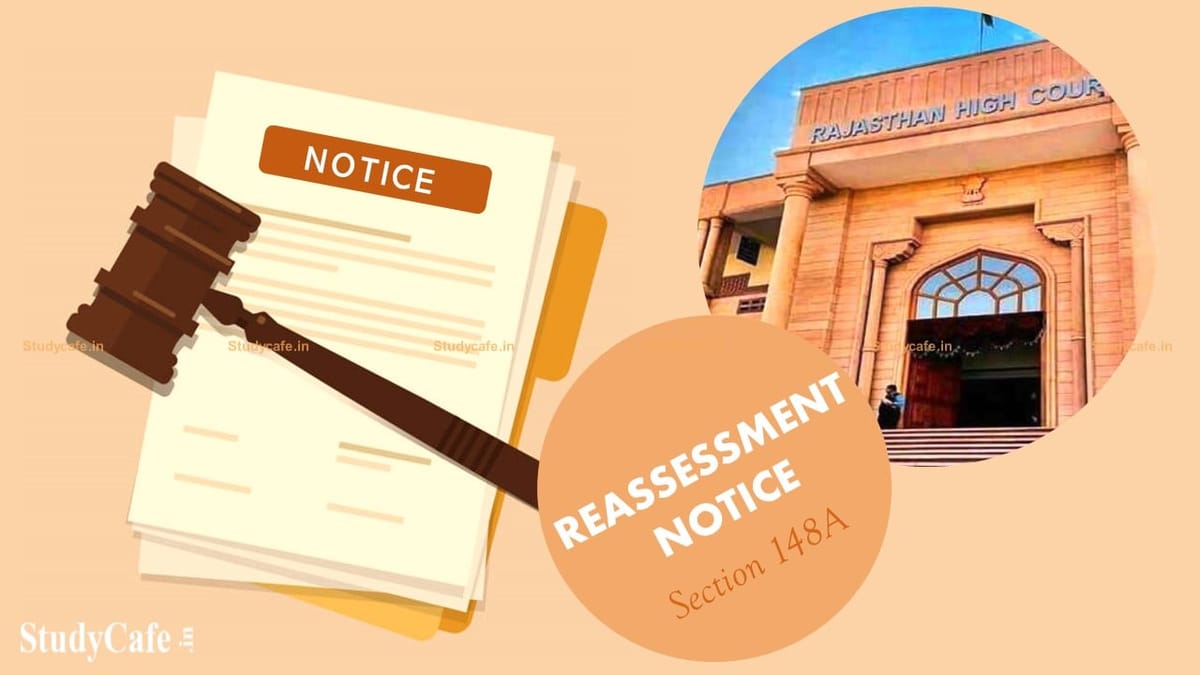Rajasthan HC has Quashed 471 Reassessment Notices Issued Prior to Enactment of Section 148A of Income Tax Act
Reetu | Jan 28, 2022 |

Rajasthan HC has Quashed 471 Reassessment Notices Issued Prior to Enactment of Section 148A of Income Tax Act
The Rajasthan High Court has ordered the cancellation of 51 reassessment notices issued prior to the enactment of Section 148A of the Income Tax Act.
The petitioners have challenged Notices of Reopening Assessments issued by Assessing Officers under Section 148 of the Income Tax Act of 1961 for various assessment years. All of these warnings were issued after April 1, 2021, and they cover the time period prior to that date. The petitioners argue that because the notices were issued after April 1, 2021, they could only be issued in accordance with the provisions of the Act in effect on April 1, 2021.
The notices are invalid in the current situations since they are issued under previous provisions that have already been replaced. The petitioners have also challenged portions of two notifications issued by the Central Board of Direct Taxes (CBDT) clarifying that the provisions of Sections 148, 149, and 151 of the Act as they stood on 31.03.2021 shall apply for the purpose of issuing notices under Section 148 for the period prior to that date. According to the petitioners, the CBDT has no authority over this explanation.
The procedure outlined in section 148A must be followed before issuing a notification under section 148. The notice was time-barred under the new section 149 in this case, and the procedure under Section 148A was not followed. As an extension of this argument, the petitioner claims that this deficiency could not be remedied by the CBDT issuing an explanation under the ostensible authority of delegated legislation.
Under sub-section (1) of Section 3 of the Relaxation Act, 2020, the power was given to the Central Government to extend the time limits for taking action and making compliances in the specified Acts up to 31.12.2020 by issuing a notification, according to the division bench of Chief Justice Akil Kureshi and Justice Sameer Jain. This was the only authority the central government had. The notices issued in the exercise of such powers had to be within the boundaries of such powers because it was delegated law. In plain terms, the Government of India was empowered to extend time limits by issuing notifications under sub-section (1) of Section 3 of the Relaxation Act, 2020. This delegation does not include any responsibility for issuing any explanations related to the requirements of the Income Tax Act.
When the CBDT issued notifications dated 31.03.2021 and 27.04.2021, it included an explanation that stated, “For the purposes of issuance of notice under Section 148 as per the time limits specified in Section 149 or 151, the provisions as they stood on 31.03.2021 before the commencement of the Finance Act, 2021 shall apply.” This clearly exceeded the CBDT’s subordinate legislation jurisdiction. The powers vested in the Government of India by the parent Act could not have been exceeded by the subordinate law.
Even if this were not the case, it is highly unlikely that the explanation in the form of clarification will change the very foundation of the legislative requirements. If the plain meaning of the statutory provision and its interpretation is obvious, the subordinate legislature cannot change the parent Act’s provisions by choosing a different viewpoint in an explanation and designating it as clarificatory. As a result, their explanations are considered unlawful and invalid.
To Read the Judgment Download PDF Given Below :
In case of any Doubt regarding Membership you can mail us at contact@studycafe.in
Join Studycafe's WhatsApp Group or Telegram Channel for Latest Updates on Government Job, Sarkari Naukri, Private Jobs, Income Tax, GST, Companies Act, Judgements and CA, CS, ICWA, and MUCH MORE!"